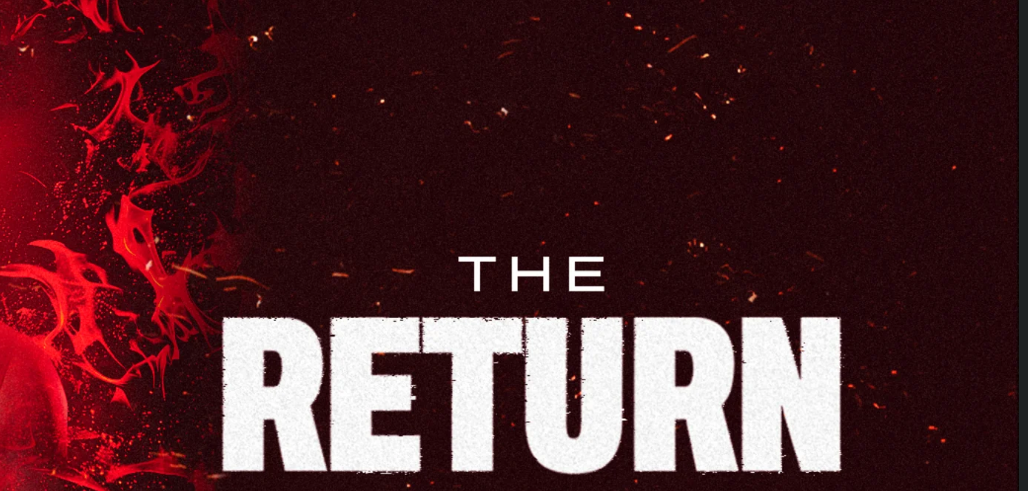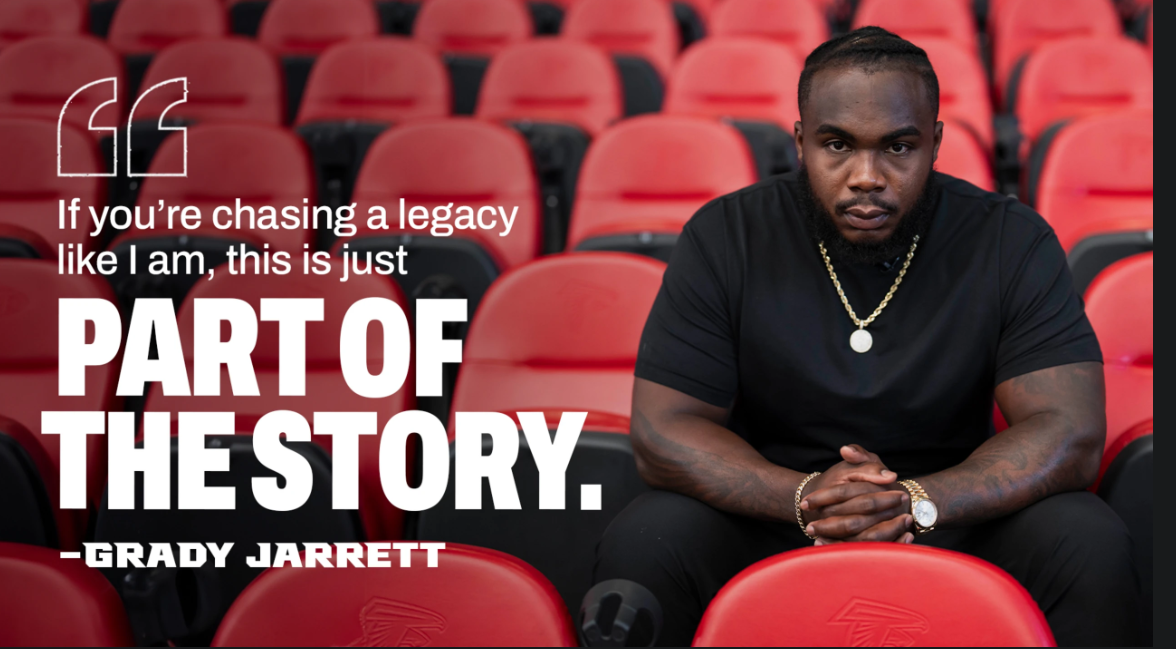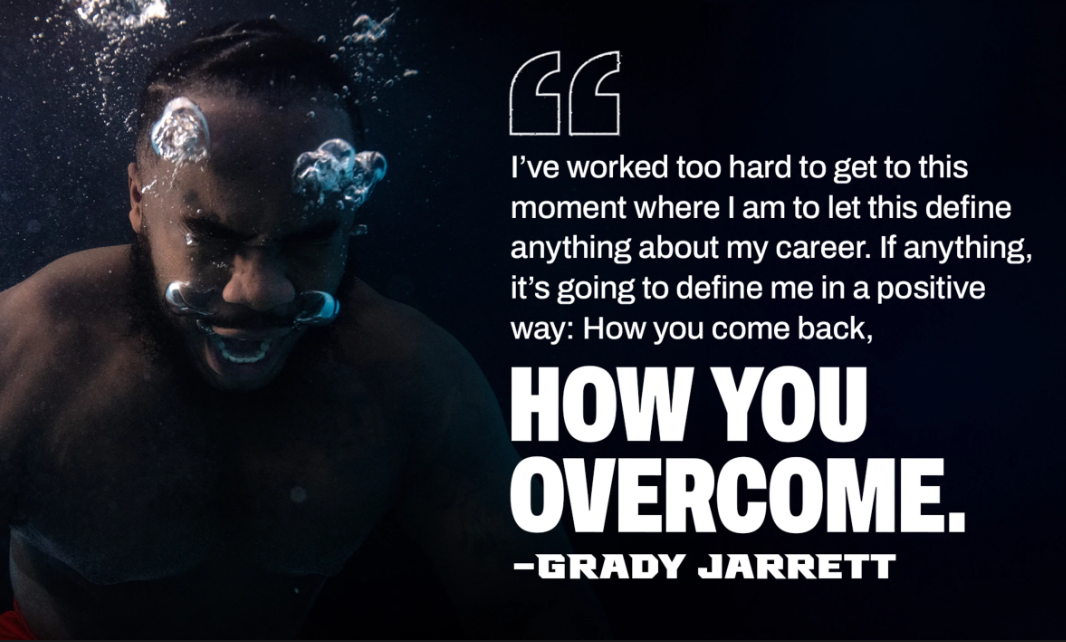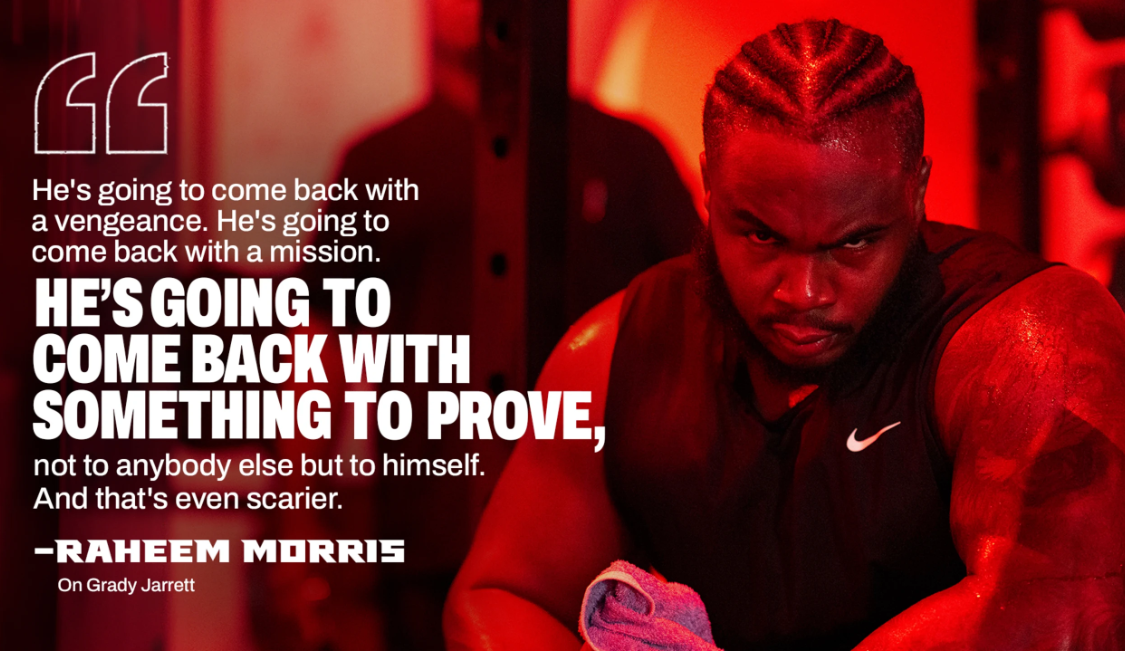
Elisha Jarrett watched as her son’s heart was breaking.
He had just come out of the blue medical tent on the sidelines at Nissan Stadium in Nashville, Tennessee. The Falcons’ Week 8 game against the Tennessee Titans had just started, and he had played the entire first defensive series without any issues.
However, when mother and son made eye contact – mother in the stands, son on the sideline – the realization struck.
“I knew,” Elisha said. “When I saw his face when he came out (of the tent), I knew that it was not good.”
Despite his physical pain, Grady Jarrett walked with his head held high to the visiting team’s locker room as the Falcons’ offense took the field.
Signs of Serious Injury
After a few quick tests with team doctors in the typically lively locker room, which was now silent, Jarrett sensed something was seriously wrong. The doctors’ demeanor indicated a difficult path ahead — one he had never faced before.
His knee, injured during the second play of the game when it collided awkwardly with an offensive lineman, didn’t feel right.
As doctors explained the situation, Elisha was escorted to the locker room. The weight of the moment and its implications for the future was heavy. All she could do was watch as her son processed the reality of a season-ending injury.
“It’s probably one of the most devastating moments that I’ve ever seen him through,” Elisha said. “It was so hard.”
“And, of course, both of us can’t cry at the same time. So, I was trying to hold him up.”
But even Elisha’s strength gave way.
“I walked out of that locker room and just lost it,” she recalled. “I had to stand outside the door for a minute.”
Reflection on Resilience
Looking back, Jarrett equated the experience to having a broken heart.
For so long, he had been a symbol of consistency and strength. Over nine years in the league, he had missed only three games. In a cruel twist of fate, he would miss nine games due to a torn ACL in his ninth professional year.
Now, nine months after that day in Nashville, Jarrett reflects on the pain and determination it took to prepare for his 10th season.
“You do everything you can to avoid situations like this, but it shows that we are all mortal,” Jarrett said. “Trials and tribulations? They’re going to come, and it’s all about how you respond.”

Overcoming the haze of painkillers and anesthesia, Grady Jarrett gradually opened his eyes. As he lay in a hospital bed in Vail, Colorado, clarity came with each moment of awareness, and one thought consumed him.
“It’s time to get to work,” he declared.
As nurses monitored his vital signs after surgery, Elisha Jarrett entered his recovery room with purpose. Striding in, she wasted no time.
“Alright, bud,” she recalled telling him, “it’s time to get started.”
Jarrett replied, “I already know.”
“And that very afternoon,” she continued, “he was up and walking.”
Following ACL surgery, the initial two weeks of recovery are crucial. The Jarrett family decided to stay in Colorado during that period, and potentially longer if necessary.
Jarrett was eager to dive into his rehabilitation. However, he soon learned that while his mind and heart were determined, his body had other ideas.
“The first two weeks were among the most painful experiences I’ve encountered, especially when the pain blocks wore off,” he reflected. “I remember struggling to get off the couch on my second day of physical therapy. The pain in my knee was overwhelming.
“I had never felt anything like that heaviness and shock. It hit me hard—this is the reality of recovery.”
Thus, the first step in his recovery journey began: mastering the basic movements we often take for granted.
Jarrett admitted that he needed support for nearly everything during those first two weeks—from getting in and out of the car to navigating around the house and climbing stairs. He hated that reality.
“I take great pride in being a protector, whether it’s for my family or on the field as a general going up against opposing teams,” Jarrett expressed. “I don’t shy away from anything. But suddenly, I found myself in a position where I required a lot of help.”
“I’ve squatted hundreds of pounds in my lifetime, but lifting my leg like this?” he said, lifting his knee a few inches. “It took every ounce of strength I had.”
Reflecting on it, this early challenge was the most difficult, hitting him both mentally and physically. It was a harsh realization that his body couldn’t perform as it once did—he felt physically grounded. For Jarrett, it was crucial to keep this struggle to himself.
“Being around the facility and seeing my teammates would have been really tough,” he shared. “To me, these guys are like my younger brothers. Most are two to three years my junior, and I take pride in being a role model for them.”
Despite his challenges, Jarrett stayed connected as much as he could. He watched games and film on his phone during rehab sessions, which wasn’t easy either. However, he was determined not to succumb to overwhelming feelings.
“I knew it was going to be a tough mental fight, but I didn’t want to let myself fall into a state of despair, especially after having it confirmed that I needed to fight this on both physical and mental fronts,” he explained.
That doesn’t mean he didn’t have tough days; he felt sadness, frustration, and moments of depression. It simply meant that, despite these feelings, “you have to be willing to fight your way out.”
“I’ve worked too hard to get here to allow this to define my career,” Jarrett stated. “If anything, it will define me positively: showing how to bounce back and overcome.”
So, he shifted his perspective, refusing to embrace a victim mentality. He focused on victories.
Jarrett’s approach during those early recovery days became straightforward: each small movement was a win, just like plays in a game.
“Whether it’s transitioning from a wheelchair to getting in and out of cars, or lifting my leg without help… each little milestone is a victory,” he noted. “It may seem minor to someone else, but it’s significant for me today.”
With every small victory, he pushed himself harder. Elisha mentioned that his determination was so strong that doctors often had to remind him to slow down.
“They told him, ‘You’re way ahead of schedule. Calm down; we don’t need any setbacks,'” she laughed. “But he wasn’t trying to hear it, and that determination has been consistent since the injury.”

Grady Jarrett isn’t the first to endure a season-ending injury, and he certainly won’t be the last. Framing his injury and recovery as a unique experience isn’t accurate, as many others have faced similar or even worse challenges.
This is the mindset Jarrett maintains as he prepares for his 10th professional season. He’s not trying to stand apart from those who have experienced injuries before or those who will face them in the future. Instead, he aims to connect with them, teach them, and provide a model to follow.
“Whether you’re in recreational leagues, high school, college, or the pros, that heartbreak is unparalleled,” Jarrett noted. “I wouldn’t have grasped that if I hadn’t gone through it myself.”
This injury offered him a fresh perspective, as most life-altering moments do. For Jarrett, both his career and his passion had to pause because of it.
“I learned just how much I truly love the game,” he explained. “When I’m able and my body is ready? There’s nothing else I would rather do than play football.”
He really missed the game—the feel of grass under his cleats, the familiar smell of a locker room after a tough practice, and the intensity he felt during crucial moments in a game.

Jarrett’s deep longing for the game fueled an unquenchable drive that grew alongside his training intensity.
When he returned to the Falcons’ facility for the offseason programs in April, new head coach Raheem Morris immediately noticed a fierce determination in Jarrett’s eyes that commanded attention.
“An angry Grady? A motivated Grady? A Grady who will play for the love of the game again and reset things?” Morris remarked. “That’s exactly what you want and need.”
The injury in Year 9 didn’t alter Jarrett’s mindset as he approached Year 10; it didn’t stoke his passion any further. When asked if it had, Jarrett quickly replied, “No.”
He functions at peak performance as it is—there’s no additional fire needed for something that’s already burning bright.
In fact, he views this as just a new chapter in the story he’s crafting for himself.
“If you’re pursuing a legacy like I am,” he said, “this is simply part of the narrative.”

Leave a Reply